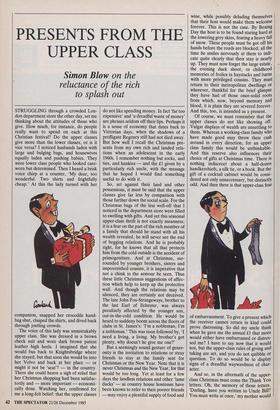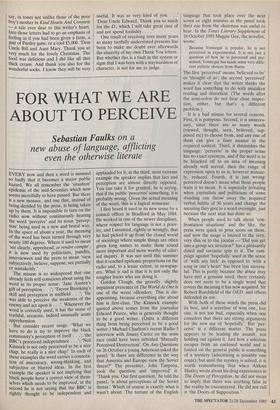PRESENTS FROM THE UPPER CLASS
Simon Blow on the
reluctance of the rich to splash out
STRUGGLING through a crowded Lon- don department store the other day, set me thinking about the attitudes of those who give. How much, for instance, do people really want to spend on each at this Christian festival? Do the upper classes give more than the lower classes, or is it vice versa? I noticed husbands laden with large and bulging bags, and housewives equally laden and pushing babies. They were lower class people who looked care- worn but determined. Then I heard a brisk voice chirp at a counter, 'My dear, too wonderful. Two shirts and frightfully cheap.' At this the lady turned with her companion, snapped her crocodile hand- bag shut, clasped the shirts, and dived back through jostling crowds.
The voice of this lady was unmistakably upper class. She was dressed in a brown check suit and wore dark brown patent leather high heels. I imagined that she would bus back to Knightsbridge where she stayed, but that soon she would be into her Volvo and back at her place — or might it not be 'seat'? — in the country. There she could heave a sigh of relief that her Christmas shopping had been satisfac- torily and — more important — economi- cally done. Watching her, confirmed for me a long-felt belief: that the upper classes do not like spending money. In fact 'far too expensive' and 'a dreadful waste of money' are phrases seldom off their lips. Perhaps it is a sense of economy that dates back to Victorian days, when the shadows of a profligate Regency still had not died away. But how well I recall the Christmas pre- sents from my own rich and landed rela- tions when an adolescent in the early 1960s. I remember nothing but socks, and ties, and hankies — and the £1 given by a particularly rich uncle, with the message that he hoped I would find something useful to do with it.
So, set against their land and other possessions, it must be said that the upper classes give far less by comparison with those further down the social scale. For the Christmas bags of the less well-off that I noticed in the department store were filled to swelling with gifts. And yet this seasonal upper-class thrift is not exactly meanness; it is a fear on the part of the rich member of a family that should he stand with all his wealth revealed, he will never see the end of begging relations. And he is probably right, for he knows that all that protects him from the cold outside is the accident of primogeniture. And at Christmas, sur- rounded by younger brothers, sisters and impoverished cousins, it is imperative that not a chink in the armour be seen. Thus these little Christmas suggestions of affec- tion which help to keep up the protective wall. And though the relations may be silenced, they are certainly not deceived. The late John Fox-Strangeways, brother to the last Earl of Ilchester, was always peculiarly affected by the younger son, out-in-the-cold condition. He would be heard to suddeny boom across the floors of clubs in St. James's: 'I'm a nobleman, I'm a nobleman.' This was soon followed by, 'I need a living, a living. My brother's got plenty, why doesn't he give me one?'
But a seemingly sound gesture of gener- osity is the invitation to relations or stray friends to stay at the family seat for Christmas or the New Year. Note that it is never Christmas and the New Year, for that would be too long. Yet at least for a few days the landless relations and other 'lame ducks' — as country house hostesses have been known to refer to their poorer friends — may enjoy a plentiful supply of food and wine, while possibly deluding themselves that their host would make them welcome forever. This is not the case. By Boxing Day the host is to be found staring hard at the lowering grey skies, fearing a heavy fall of snow. These people must be got off his hands before the roads are blocked; all the time he smiles nervously at them to indi- cate quite clearly that their stay is nearly up. They must now forget the large estate, the evening duck shoot, or childhood memories of frolics in haystacks and barns with more privileged cousins. They must return to their metropolitan dwellings or wherever, thankful for the brief glimpse they have had of those once-solid roots from which, now, beyond memory and blood, it is plain they are severed forever. And this, too, is intended as a present.
Of course, we must remember that the upper classes do not like showing off. Vulgar displays of wealth are unsettling to them. Whereas a working-class family who have made good may throw their cash around in every direction, for an upper class family this would be unthinkable. And this reserve also influences their choice of gifts at Christmas time. There is nothing indiscreet about a half-dozen handkerchiefs, a silk tie, or a book. But the gift of a cocktail cabinet would be consi- dered not only unneccessary, but distinctly odd. And then there is that upper-class fear of embarrassment. To give a present which the receiver cannot return in kind could prove distressing. So did my uncle think when he gave me the annual £1 that more would either have embarrassed or distres- sed me? I have to say now that it would not, but the upper-class rules of giving and taking are set, and you do not quibble or question. To do so would be to display signs of a dreadful waywardness of char- acter.
And so, in the aftermath of the upper- class Christmas must come the Thank You letters. Oh, the memory of those letters. `Darling, have you written to Uncle Bill? You must write at once,' my mother would say, in tones not unlike those of the poor boy's mother in Kind Hearts And Coronets — a tale ever dear to this writer's heart. Into those letters had to go an emphasis of feeling as if you had been given a farm, a Pair of Purdey guns, or a cool £5,000. 'Dear Uncle Bill and Aunt Mary. Thank you so very much for the lovely Christmas. The food was delicious and I did like all that thick cream. And thank you also for the wonderful socks. I know they will be very useful. It was so very kind of you. . . `Dear Uncle Edward, Thank you so much for the £1, which I will take great care of and not spend foolishly. . .
One result of receiving over many years so many tactfully understated presents has been to make me doubt ever afterwards the sincerity of my own Thank You letters. But whether this is a fault in the system or signs that I was born with a waywardness of character, is not for me to judge.



















































































 Previous page
Previous page